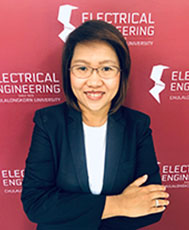Series to Highlight Women in Signal Processing: Dr. Supavadee Aramvith

 Dr. Supavadee Aramvith, Ph.D.
Dr. Supavadee Aramvith, Ph.D.
Head, Multimedia Analytics and Processing Research Unit
Department of Electrical Engineering
Chulalongkorn University, Thailand
Dr. Supavadee Aramvith received her B.S. (first class honors) degree in Computer Science from Mahidol University, Bangkok, Thailand, in 1993. She received her M.S. and Ph.D. degrees in Electrical Engineering from the University of Washington, Seattle, USA, in 1996 and 2001, respectively. She joined Chulalongkorn University in June 2001. Currently, she is an Associate Professor at the Department of Electrical Engineering, Chulalongkorn University, Bangkok, Thailand. Past experience includes Associate Head in International Affairs (2007-2016, 2020-Present), Head, Communication Engineering Division (2013-2016), Head, Digital Signal Processing Laboratory (2017-2018), Head, Multimedia Analytics and Processing Research Unit.
Her research specialization is in video coding and processing, specifically error resilience for wireless video transmission, video analytics for surveillance applications, and embedded computer vision system. She has successfully advised 11 Ph.D., 27 Master’s, and 36 Bachelor’s degree graduates. Her research on Image Super-Resolution recently won a gold medal award from Innovation Week Africa (IWA 2020) and a silver medal award from the 48th International Exhibition of Inventions Geneva 2021.
A prolific researcher, she published over 130 papers in international conference proceedings and journals along with four chapters in internationally published books. She has a rich experience in project management, having served as project leader and former technical committee chair to the NBTC and the former MICT of Thailand. In addition, she is very active in the international arena with leadership positions in international networks such as the JICA Project for AUN/SEED-Net, and professional organizations such as IEEE, IEICE, APSIPA, and ITU.
We approached Dr. Aramvith with a few questions:
Q. Why did you choose to become a faculty in the field of Signal Processing?
My first interest in the field of Signal Processing was when I chose my Ph.D. topic at University of Washington in Video Coding under the supervision of Prof. Ming-Ting Sun. As we know, during 1996-2001, it is the early stage of video compression and video transmission over wireless channels. I have been blessed to be mentored by one of the most experienced video coding experts who made me able to publish two papers in IEEE transactions in Circuits and Systems for Video Technology. Upon my graduation in 2001, I started my work at Chulalongkorn University and fully established my career as a digital signal processing lecturer. Twenty years have passed. I still feel passionate about my research in video coding and video analytics. Signal processing is an important fundamental area with vast applications, especially now with machine learning and artificial intelligence (AI).
Q. How does your work affect society?
My research on video analytics spans many applications, primarily to target sustainable development goals (SDGs). I work on AI-based video analytics for surveillance applications. The areas are face recognition, image super-resolution, and video anomaly detection, and they are helpful for home/public monitoring and healthcare in smart cities. I was the project leader in the Electronics Thai Sign language Communication System for the deaf and hearing-impaired people funded by the Thailand government. We developed a helpful system to bridge the communication between deaf and normal hearing people. It is good to conduct research that impact society. I am passionate to continue doing this with liked mind colleagues and students.
Q. What challenges have you had to face to get to where you are today?
We all always face multiple challenges throughout our life. The challenges make us grow. We should take constructive views toward those challenges. I pursue achievements by setting goals. Thus, to achieve goals, I have to work through hurdles in several stages of life. During my Master and Ph.D. studies in the USA, my challenges are strengthening my technical skills and English skills significantly. I worked very hard and built up my confidence since then. When I started working in Thailand, the challenges lie in building up my profile, research, direction, and who I want to be in the next 5, 10, 20, 30 years. My research has been built up from video coding to video analytics. I achieve good outcomes. Among all, the common challenge that everyone may have is time management and life balance. I put more emphasis on these two factors seriously on the work focus and prioritize what is essential. Ultimately, this is a question I continue to ask myself: How can I build a successful career and yet have good health and still can enjoy living a life?
Q. What advice would you give to scientists/engineers in signal processing?
It is impressive to see how vast applications that signal processing serves as a basis and can be applied. While you focus your interest in your expertise field, you need to continuously learn the new techniques and integrate knowledge with other interdisciplinary fields. The word “lifelong learning” is increasingly important and is much sought by most people. As a long-time member of IEEE Signal Processing Society and Signal Processing Society Thailand Chapter Chair, I can see the development of signal processing resources increasing year by year, both publications and online resources. The SPS flagship conferences are where we can learn new innovative ideas and networks with experts. I am glad to be a part of the Women in Signal Processing Society. Remember to open your mind to explore new ideas, networking and collaborating with experts. Finally, you can build up good research with decent contributions.
Q. Would you like to add anything else?
Thank you for having me at the SPS newsletter. I am happy to further the conversation with fellow signal processing peers to share experiences. You can reach me at supava@ieee.org.

